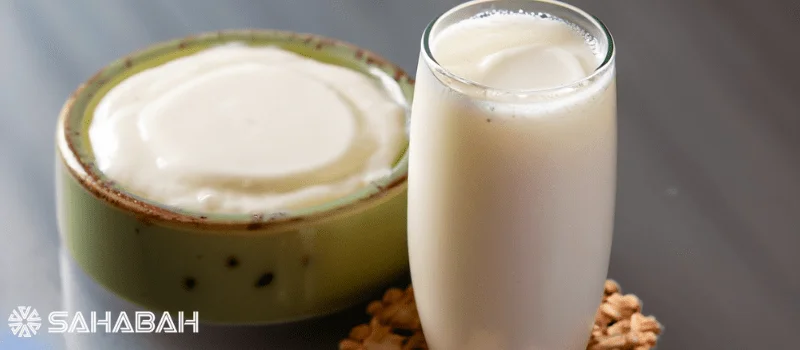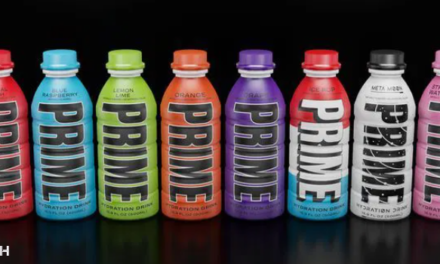Kefir, a fermented milk drink, has gained popularity in recent years due to its potential health benefits. However, for those following dietary restrictions such as those in the Islamic faith, the question remains: is kefir halal? To determine the halal status of kefir, it is important to examine its production process and ingredients. In this blog post, we will explore the facts and provide clarity on this topic for our readers. So, if you’ve ever wondered if kefir health drink can be considered halal, keep reading to find out the answer.
Permissible Probiotic or Potentially Prohibited
Kefir is a fermented milk drink made by inoculating milk with kefir grains. The grains, which resemble small cauliflower florets, contain a symbiotic culture of bacteria and yeasts that ferment the milk into kefir.
Kefir has gained popularity in recent years due to its purported health benefits:
- Probiotics for gut health
- Antibacterial and anti-fungal properties
- Boosts immunity
- Aids digestion
- Anti-inflammatory effects
“The probiotics and enzymes in kefir support healthy digestion, boast immunity, increase energy, clarify skin, and promote overall well-being.”
However, the Islamic permissibility of consuming kefir is debated among scholars. This article will examine the evidence regarding whether or not kefir is considered halal according to Islamic dietary laws.
Islamic Rulings on Kefir
The majority opinion among Islamic scholars is that kefir is halal to consume.
“This drink is permissible, because the process of fermentation does not do anything that would make it haraam.”
They argue that since kefir is made from halal ingredients like milk and kefir grains, the fermentation process does not make it prohibited. As long as no alcohol or other forbidden ingredients are added, it is halal.
However, a minority of scholars believe kefir may be haram under certain conditions:
- If it is over-fermented and contains trace amounts of alcohol
- AskImam states fermentation over 24-48 hours could produce alcohol
- If the process uses added yeasts that contain alcohol
- IslamWeb prohibits kefir made with commercial yeast
There are also differences between the Islamic schools of thought:
| School | Ruling |
|---|---|
| Hanafi & Maliki | Permitted with caution about fermentation time |
| Shafi & Hanbali | Prohibited due to potential alcohol |
The evidence suggests most kefir is halal, but care must be taken with the fermentation process and ingredients.
How to Ensure Kefir is Halal
To avoid the prohibition concerns and consume halal kefir, the following guidelines should be followed:
-
Use kefir grains to start the fermentation process, rather than commercial yeasts or cultures which may contain alcohol.
- According to AskImam, “kefir grain itself is not doubtful.”
-
Control the fermentation time, optimally 24-48 hours.
- As IslamQA states:
“If it is left too long, it could – according to some contemporary scholars – turn into an intoxicant drink.”
- As IslamQA states:
-
Check for any alcohol content before consuming.
- HalalMUI recommends testing kefir products to ensure no alcohol.
-
Avoid flavored kefirs, which may contain alcohol as an ingredient.
- Probiotics Farming states added flavors could make it haram.
Following these guidelines allows Muslims to receive the health benefits of kefir while adhering to the Islamic dietary restrictions regarding alcohol and intoxicants. With properly controlled fermentation, most kefir products on the market today are considered halal.
Is Kefir Halal – FAQ
What is kefir?
Kefir is a fermented milk drink that is often consumed for its health benefits. It is made by fermenting milk with kefir grains, which are a combination of bacteria and yeast cultures.
Is kefir halal?
Kefir can be considered halal if it is made using halal ingredients and does not contain any haram substances. However, the ruling may vary depending on different Islamic scholars.
Does kefir contain alcohol?
Kefir can contain a small amount of alcohol as a byproduct of the fermentation process. The amount of alcohol present in kefir is usually very low, typically around 0.5% or less.
What do Islamic scholars say about consuming kefir?
Islamic scholars have different opinions regarding the consumption of kefir. Some consider it permissible to drink as long as the alcohol content is within the acceptable limits, while others may classify it as haram due to the presence of alcohol.
What does the Quran and hadith say about consuming fermented beverages?
The Quran and hadith do not specifically mention kefir or fermented beverages. However, it is generally advised to avoid consuming anything that may intoxicate, and the prohibition of alcoholic beverages is well established in Islamic teachings.
Can I drink kefir during fasting?
The permissibility of consuming kefir during fasting depends on the interpretation of Islamic scholars. Some may consider it acceptable, while others may advise against it due to the alcohol content. It is recommended to consult with a knowledgeable scholar for a specific ruling.
Are there any health benefits of consuming kefir?
Kefir is known for its probiotic properties, as it contains beneficial bacteria and yeast cultures. It is believed to contribute to improved digestion, immune system support, and overall gut health.
How can I ensure that the kefir I consume is halal?
If you want to ensure the kefir you consume is halal, you can either make your own kefir at home using halal ingredients or look for a reputable halal certification on commercially available kefir products.
What is the opinion of the Hanafi school of thought on kefir?
The Hanafi school of thought generally considers kefir permissible to consume, as long as the alcohol content is within the acceptable limits. It is recommended to follow the rulings of a qualified Hanafi scholar for a more detailed understanding.
Conclusion
The majority of evidence indicates that kefir is permissible to consume in Islam, as long as care is taken with the fermentation process and ingredients.
As summarized on MyReligionIslam.com:
“Kefir is halal when prepared properly using kefir grains, milk and water, and allowing it to ferment for an appropriate time to avoid any potential alcohol formation.”
Proper fermentation time (24-48 hours) and avoiding added yeasts or alcohol-containing flavors are key to ensuring the kefir remains within the Islamic dietary restrictions. As long as these guidelines are followed, most kefir on the market today is considered halal.
Consuming kefir has many health benefits and is permissible for Muslims who want to maintain halal dietary standards. With an awareness of the fermentation process and ingredients, kefir can be safely incorporated into a halal diet. This demonstrates the balance within Islamic law between promoting human well-being through beneficial foods and drinks while prohibiting harmful intoxicants.





